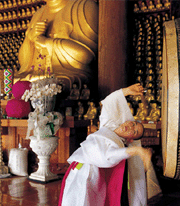The Buddhist rituals originate from the Era of the
Three States and are handed down to the present day as the great part
of the Buddhist practice of austerities. The Yeongsanjae Preservation
Association tries to protect and advance the Korean and plays a great
role in publicizing our nation's excellence and the law of Buddha
around the world.
The Genealogy of the Beompae Chanter in the Buddhist Rituals
(1) The Genealogy of the Era of Three States and Goryo Dynasty
According to a record of Buddhist ceremonies in the Era of Three
States, Baekgogwa was installed at Hyangryongsa Temple in the 15th
year of King Jinpyeong's reign, AD 613. There is a detailed record
of Beompae (Buddhist music) in Gingamguksa's inscription of Daegongtab
at Ssanggyesa Temple, Hadong, Gyeongsang-do but no record on the
genealogy of Beompae.
(2) The Genealogy of Joseon Dynasty
Joseon Dynasty has left behind the most materials of Buddhist rituals
with all its policy of upholding Confucianism and suppressing Buddhism.
Beomeumjongbo by Daehwihwasang in 1748, the 4th year of King Yeongjo's
reign, says about the genealogy of Beompae as follows.
1. Gukyung-King Sejong (1418-1450)-
2.Eungjun-
3.Hyeun-
4.Cheonhwi-
5.Yeoncheong-
6.Sanghwan(since the 1592 Korea-Japanese War)-
7.Seolho-
8.Ungyedangbeopmin (King Hyojong, 1650-1659)-
9.Hyegam-the 10th Generation Sunyeong, Yumin, Chaecheong-(Bongamsa
Temple), Chano-(Nampyeong, Bulhoesa Temple), Seonggak (Neungseon
Cheombulsa, Gaecheonsa Temple), Chukchal-(Haenam, Daeheungsa Temple),
Daehwi-(Jangneung, Borimsa Temple), Leejin, Pungsikbang-(Suncheon,
Seonamsa Temple), Gakseon-(Gurye, Hwaeomsa Temple), Doin-(Suncheon,
Daegwangsa Temple), Yeongi-(Goheung, Geumtapsa Temple)-the 11th
Generation Gyehwan, the Twelfth Generation Honghae
(3) Designating the Buddhist Rituals as Intangible Cultural Properties
Since 1970
(A) Yeongsanjae, (Designated as Important Intangible Cultural Properties
No. 50 on November 11, 1987)
(B) Beompae for the Buddhist rituals were designated
as Important Intangible Cultural Asset No.
50 on November 5, 1973, including Park Song-Am (1915~2000), Kim
Un-Gong (1907 ~1984), and Jang Byeok-Eung (1909~2000)
On November 11, 1987, Beompae, Jangeom, and Buddhist dancer Priest
Lee Il-ung (1920~2003) were designated as cultural assets, making
a systematic genealogy.
|


